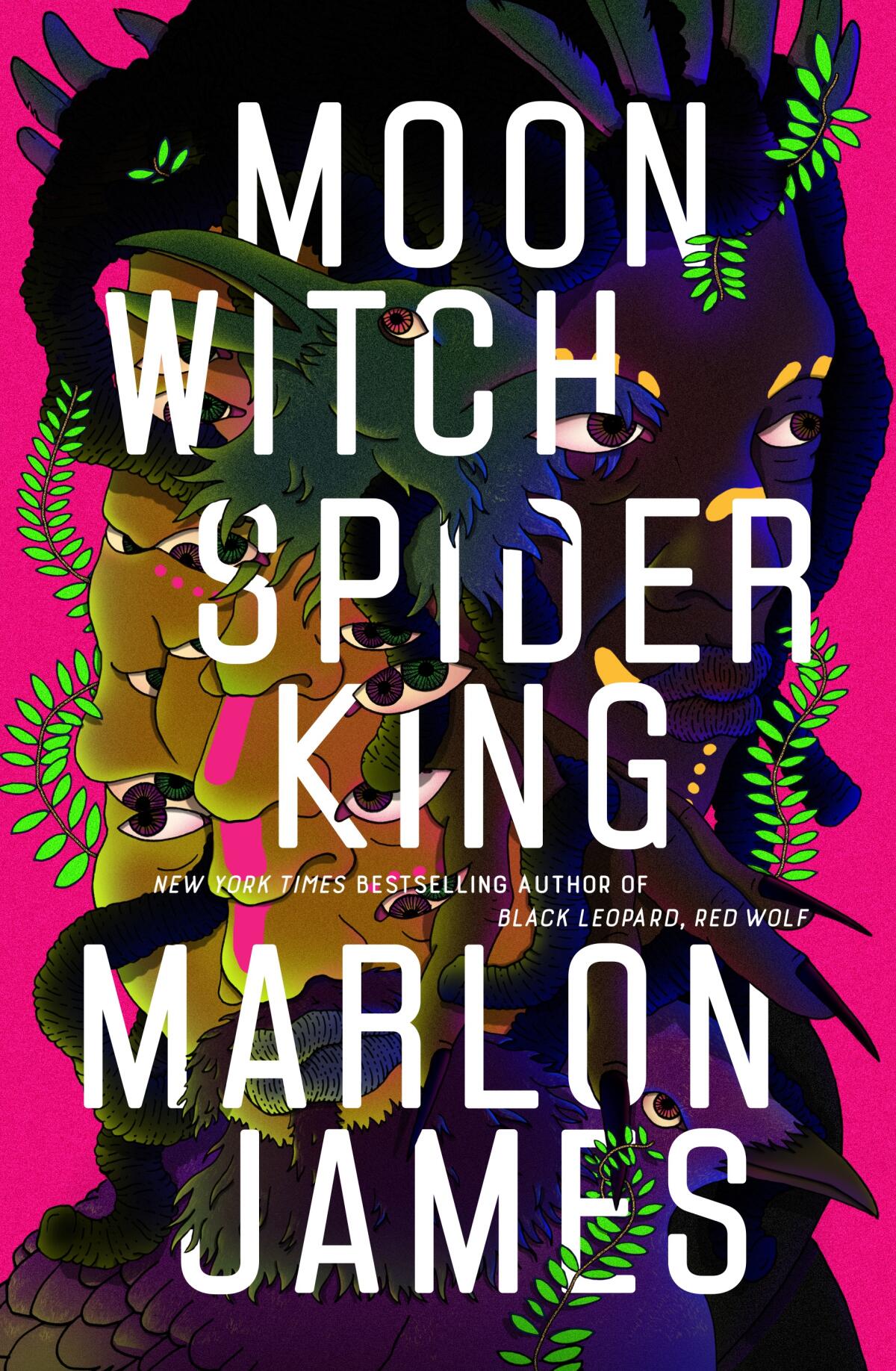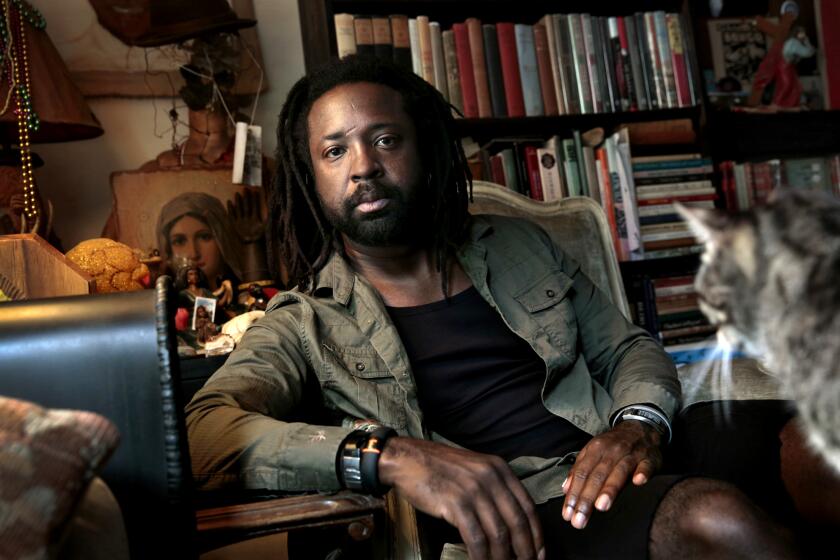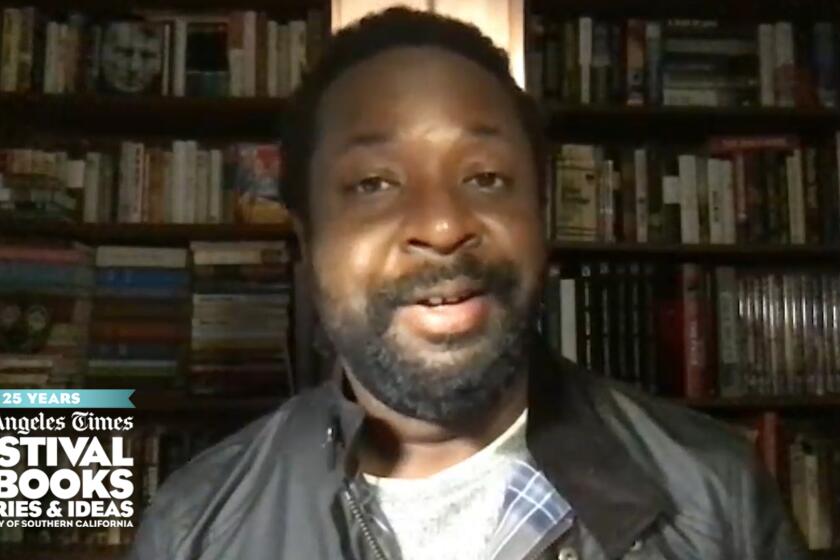Review: Marlon James’ African fantasy saga continues, and the witch has her say

- Share via
On the Shelf
Moon Witch, Spider King
By Marlon James
Riverhead: 656 pages, $30
If you buy books linked on our site, The Times may earn a commission from Bookshop.org, whose fees support independent bookstores.
Writers of elevated and candescent fantasy hold a mirror to the worlds they live in and are master architects of the worlds they create, slanting reflections like a carnival fun house. With “Moon Witch, Spider King,” Marlon James is that writer.
In the second book of his Dark Star trilogy, James coaxes beauty from dark thoughts, leaving readers with a concaved, mystical and African-inspired world that begins in free-fall. Sloshed by his robust language, readers are plunged into a shocking cold bath of violence perpetrated against a girl.
We first met Sogolon in Book 1 of the trilogy “Black Leopard, Red Wolf,” in which she was the antagonist — the obstacle faced by the preternaturally gifted shape-shifter Tracker as he courses a fantastical kingdom in medieval Africa in James’ pointed revision of the Eurocentric fantasies that dominated this genre over the last century.
But this, James immediately signals, is Sogolon’s story. In Part 2 of his Rashomon-structured epic, it’s her version and her time. When we meet her, she has no name. She has yet to claw her way from a termite hill to a ditch, to Kongor and onward toward the throne room — a journey made of men and magic that marks her body until she chooses her own path. In time she will be called Moon Witch, but isn’t “witch” what some call women who survive prolonged abuse and still pray?
Marlon James, whose novel “Black Leopard, Red Wolf” pioneered queer fantasy, thanks Mary Shelley and “Moby Dick” for predicting our current crisis.
For 177 years, Moon Witch has survived a patriarchal and brutal world. There is great violence but it is not gratuitous, nor is it an endorsement. Rather, it is an exposure of violence in the real world, which it reflects rather than deflecting. James has chosen to reveal it for all of us to heal it — this world where women and girls are treated as lesser beings; even the most beloved women are dodging daggers. James’ fantastical portrayal of harsh realities recalls the words of Tupac, “I didn’t create the thug life. I diagnosed it.” James has made the novel a diagnosis of what it can mean to be woman.

And truth hurts. “Moon Witch, Spider King” requires a trigger warning for those accustomed to G-rated fantasy. James once called his trilogy an “African ‘Game of Thrones,’” and while he later regretted the comparison, scenes involving the collision of his kingdoms, families and power seekers could easily rival that series’ unforgettable Red Wedding.
In a world as thoroughly imagined as J.R.R. Tolkien’s, no detail seems spared. If he wanted, James could take a reader on a tender search for a four-leaf clover in a hobbit’s meadow and we would not only see it but catch feelings about the stroll. James allows us to sense as keenly as Tracker, to smell a person coming. Does she smell of men? Of tall grasses? Poo? Then we know who the character is and where she’s likely been.
Occasionally, as with any good food, the story’s richness can rankle in such great portions. Dense passages grow heavy, and the story can stall too long in a single moment, making the reader want to skim — less out of boredom than the kind of excitement that might lead one to ignore the assembly instructions for a glorious new gadget. That would be a mistake. Every step in this novel is worthwhile. And, oh, the sprints.
Marlon James chats during the Festival of Books about his novel, “Black Leopard, Red Wolf,” winner of The Times’ 2019 Ray Bradbury Prize.
Fast-paced moments make use of all five senses, plus a sixth and maybe seventh — literally and figuratively including Sogolon’s run for her life. Only one early scene in “Black Leopard” outdoes it, in which Tracker is rescuing a drowned king from a dangerous underworld.

But again, this adventure belongs to Sogolon. Her history, her memories even, will collide with Tracker’s; any two people witnessing the same event will remember differently. Their event surrounds a search for a boy who has been missing three years. Books 1 and 2 — which don’t, by the way, have to be read in order — constitute not so much a puzzle as a competition over what’s remembered, forgotten, intentionally left out, manipulated or unknown; each calls her or his version “the one truth.” If you require a timely hook connecting James’ kingdom to our current state in America, there it is.
Primal in its way of regarding the human body, “Moon Witch, Spider King” won’t shy from terms like koo (for vagina) and foreskin; it will repeatedly invoke them — wash them, pull on them, let a spirit into them. Like the violence, it’s not for nothing. Sex and sexuality are an underlying chant, a low hum sung from deep within the chest of these pages like a cantillation.
Full figured and richly drawn, “Moon Witch, Spider King” is the bridge of a trilogy and also a creation that, like James’ talent, stands alone.
Some readers may be surprised that Marlon James has followed up his epic, critically acclaimed, 2015 Man Booker-winning “A Brief History of Seven Killings” with a fantasy novel.
Deón is a criminal defense attorney, college professor and most recently the author of novel “The Perishing.” She lives in Los Angeles.
More to Read
Sign up for our Book Club newsletter
Get the latest news, events and more from the Los Angeles Times Book Club, and help us get L.A. reading and talking.
You may occasionally receive promotional content from the Los Angeles Times.








